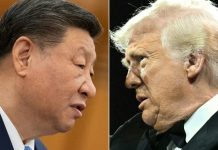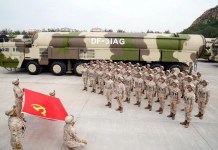After months of warning each other with a military confrontation, the US Army and the Chinese People’s Liberation Army (PLA) have taken a U-turn and held a joint training on humanitarian disaster response.
F-35 vs F-15: Why Qatari F-15 Eagles ‘Stand No Chance’ Against Israeli / Emirati F-35 Stealth Jets?
The Disaster Management Exchange (DME) is an annual training event held every year alternating between the US and China as hosts. The exercise started in 2005 when militaries began talking about a cooperated response in an event of a major disaster.
“The DME is an annual US Army Pacific (USARPAC) defense exchange with the PLA that began in 2005 to help integrate the U.S. and PLA into international response structures in the Indo-Pacific Region in accordance with the 2014 Association of South East Asian Nations (ASEAN) Standard Operating Procedure to allow for a more effective multi-national disaster response,” a statement by the US Army said.
“It also seeks to reduce risk between U.S. and PLA forces responding to a national disaster crisis in a third country by addressing de-confliction of military forces operating in close proximity to each other,” it added.
The training exercise took place remotely in the wake of the pandemic from November 10-12. The statement emphasized that the long-established exchange is executed to support the US efforts to build a constructive, stable, and results-oriented defense relationship with the PLA.
On the other hand, the US Navy and the PLA are locked in an intense stalemate in the South China Sea for several months. The US had sent warships and aircraft carriers into the South China Sea with increasing frequency, even as the US Navy was struggling to deal with multiple COVID-19 outbreaks.
China claims that its counter efforts are in response to all the “military provocations”. China had also reportedly conducted exercises with the warships of the People’s Liberation Army Navy.
Taiwan’s cross-Strait relations with mainland China have been deteriorating with Beijing claiming sovereignty over the island and seeking its return to the mainland fold even by force if necessary. It has staged several drills and is firm on its motives.
China has been openly threatening Taipei against its “secessionist” motives, meanwhile, Taiwanese President Tsai Ing-wen has refused to accept the one-China principle and is strongly supports the self-governance of Taiwan.
The US has been at the forefront of supporting the Taiwanese forces by arming the Taiwanese military. Washington has said that it will lend its military support if China invades the island.
Grant Newsham, a retired US Marine Corps officer and former US diplomat wrote in a sharply worded opinion piece that instead of engaging with the PLA if the US military “truly engage and train” with Taiwan’s military, “it might be easier to persuade them [Taiwan military] to improve their defenses.”
“So while the US Army locks arms with the PLA it is apparently too much for Americans to train seriously with Taiwan – a Chinese democracy of 23 million people on an island that is indispensable to America’s Asia-Pacific defense posture. And there is the implicit guarantee to protect Taiwan,” Newsham wrote.
He also pointed out that either the US Defense Department and military leaders “can’t think straight – or aren’t serious about a supposed China threat or perhaps the Uighur concentration camps, freedom in Hong Kong and bullying America’s friends don’t matter that much.”
While the Trump administration has attacked Beijing vehemently on global and international platforms, the virtual exercise comes at a time when military experts have raised concerns over accidental confrontations in the sea after Donald Trump’s loss in the Presidential election.
“Despite Army leaders’ recent boasts that the US Army is back in the Pacific and itching to get into a fight, the recurring exercise suggests a curious passive-aggressiveness towards the Chinese threat – or, less charitably, resembles a rooster crowing from atop the barnyard dung heap,” stated Newsham.




